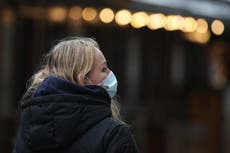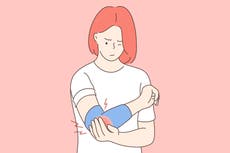Pregnancy loss certificates rolled out for parents under government’s first Women’s Health Strategy
Every day around 14 babies die before, during or soon after birth in the UK

Pregnancy loss certificates must be rolled out across England for parents who have lost a child before 24 weeks in an attempt to acknowledge their difficult situation, the government has said.
The measure was unveiled in the government’s first women’s health strategy for England which was specifically designed to address the gender health gap.
Every day, around 14 babies die before, during or soon after birth in the UK, but campaigners have long warned the issue is routinely ignored by society and remains a taboo.
Amy Jacksonson, of the Lily Mae Foundation, which support families impacted by a baby’s death, told The Independent they were pleased “it has finally been recognised that a child born before 24 weeks deserves the acknowledgement that any other human being receives”.
The representative added: “To many of our families who have sadly lost a baby before 24 weeks, this small gesture will mean the world, and provide recognition that their precious baby existed.
“To discriminate between gestations only serves to belittle a loss before 24 weeks and we at the Lily Mae Foundation truly believe that a loss is devastating no matter what the gestation. The loss of an entire lifetime of hopes and dreams.”
The government-led Women’s Health Strategy for England, published on Wednesday, follows calls for evidence which prompted nearly 100,000 responses from people up and down England.
Women said they feel ignored by health professionals - with the feedback also revealing a dearth of knowledge from some health workers about illnesses which only impact women.
The health strategy calls for compulsory teaching and assessment on women’s health “for all incoming graduating medical students and incoming doctors”, as well as establishing a new investment of £10 million funding for a breast screening scheme. The latter will deliver 25 new mobile breast screening units in parts of the country which struggle most to get women to attend screenings.
In a bid to eradicate extra obstacles to IVF for women who are in same-sex relationships, the report suggests scrapping the current need for same-sex couples to fork out money on artificial insemination to demonstrate their fertility status.
Along with a series of other measures, the strategy also calls for better “transparency on provision and availability of IVF so prospective parents can see how their local area performs to tackle the ‘postcode lottery’ in access to IVF treatment”.
Julia Chain, chair of the Human Fertilisation and Embryology Authority, said: “We know that access to NHS fertility services varies depending on where you live and who you might be in a relationship with.
“So we are particularly pleased to see commitments to address the geographical divide, provide fairer funding for same-sex couples and put an end to the non-clinical criteria which prevented patients from accessing NHS treatment if they had a child from a previous relationship.”
The strategy follows mounting criticism of the gender health gap in the UK. Many experts warn scientific research has long overlooked women’s bodies - with many conditions which only affect women receiving less funding.
There are also a number of studies that show women’s pain is often taken far less seriously than that of men. While the data demonstrates women are not only forced to spend longer stretches of time waiting in emergency departments but are also less likely to be prescribed effective painkillers than men.
Maria Caulfield, women’s health minister, said: “Tackling the gender health gap will not be easy - there are deep seated, systemic issues we must address to ensure women receive the same standards of care as men, universally and by default.”
At the end of last year, the government announced a new position of women’s health ambassador would be created to help “reset the dial” on decades of gender health inequality in England.
Samantha Allen, chair of the NHS Confederation’s Health and Care Women Leaders Network, said: “Women spend more of their life in poor health, often limiting their ability to work and participate in everyday activities as they try and navigate a health and care system which is not addressing their needs.
“The Women’s Health Strategy provides an opportunity to tackle the deep rooted and systemic issues that exist within our health and care system.”
Ms Allen noted women constitute three quarters of the NHS workforce, while also making up over 80 per cent of the social care workforce.
“And a high proportion of unpaid carers,” she added. “Women have been a significant presence in the frontline response to Covid-19, and our female health and care workforce survey found that this had negatively impacted on their health. The role women play in the wellbeing of society is significant and this strategy sets clear priorities to ensure their needs are met.”
Join our commenting forum
Join thought-provoking conversations, follow other Independent readers and see their replies
Comments



Bookmark popover
Removed from bookmarks